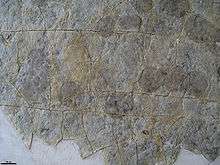Fossil trackway

A fossil trackway is a type of trace fossil, a trackway made by an organism. Many fossil trackways were made by dinosaurs, early tetrapods, and other quadrupeds and bipeds on land. Marine organisms also made many ancient trackways (such as the trails of trilobites and eurypterids like Hibbertopterus).
Some basic fossil trackway types:
The majority of fossil trackways are foot impressions on land, or subsurface water, but other types of creatures will leave distinctive impressions. Examples of creatures supported, or partially supported, in a water environment are known. The fossil "millipede-type" genus Arthropleura left its multi-legged/feet trackways on land.
Hominid trackways
The foremost hominid trackway is the 3.7 mya Laetoli footprints of Tanzania. The trackway is now preserved under a protective layer of earth.[2]
Early Tetrapod trackways
The earliest land creatures (actually land-marine coastal-riverine-marshland) left some of the first terrestrial trackways. They range from tetrapods to proto-reptilians and others.
Northeast North America--northwest proto-Europe
The Permo-Carboniferous of Prince Edward Island contains trackways of tetrapods and stem-reptiles.[3] Macrofloral, and palynological data help date them.
Ireland hosts Late Devonian tetrapod trackways from the Valentia Slate Formation.[4] (The article discusses the history of the tetrapods, lobe-finned fish, and the ray-finned fish-(the later teleosts).
Australia tetrapods
The earliest fossil trackway of primitive tetrapods in Australia occurs in the Genoa River Gorge, Victoria, dating from the Devonian 350 million years ago .[5]
Dinosaur trackways
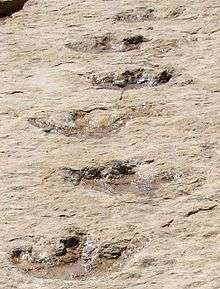
Dinosaurs lived on the continents before grasses evolved (the "Age of the Grasses" evolved with the "Age of the Mammals"); the dinosaurs lived in the Triassic, Jurassic, and Cretaceous and left many trackways, both from plant-eaters and the meat-eaters, in various layers of mud and sand.
With scientific analysis, dinosaur specialists are now analyzing tracks for the walking-speeds, or sprint-running speeds for all categories of dinosaurs, even to the large plant eaters, but especially the faster 3-toed meat hunters. Evidence of herding, as well as pack hunting are also being investigated.
Africa trackways
An example trackway from Africa is a trackway in 140 ma rose-colored sandstone of Chewore Area, Lower Zimbabwe Rift Valley.[6] The small footprint size, with both manus and pes implies that it is a trackway of a juvenile, a probable carnosaur.
North America trackways
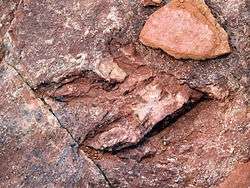
The western regions of North America, especially the western border of the Western Interior Seaway, are common for dinosaur trackways. Wyoming has dinosaur trackways from the Late Cretaceous, 65 ma.[7] (A model example of this 3-toed Wyoming trackway was made for presentation.)[8]
Mammal trackways
Mammal trackways are among the least common trackways. Mammals were not often in mud, or riverine environments; they were more often in forestlands or grasslands. Thus the earlier tetrapods or proto-tetrapods would yield the most fossil trackways. The Walchia forest of Brule, Nova Scotia has an example of an in situ Walchia forest, and tetrapod trackways that extended over some period of time through the forest area.
Australia trackways
A recent marsupial trackway site in the Colac district of Australia (west of Colac) contains marsupial trackways as well as kangaroo and wallaby tracks.[9]

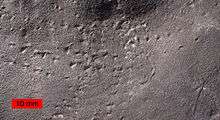
 Moa footprints near the Manawatū River, New Zealand.
Moa footprints near the Manawatū River, New Zealand.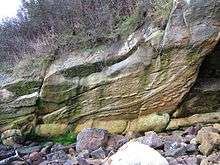 Hibbertopterus trackway: negative relief image, a groove infilled by sand appears as a ridgeline
Hibbertopterus trackway: negative relief image, a groove infilled by sand appears as a ridgeline
See also
| Wikimedia Commons has media related to Fossil trackways. |
| Wikimedia Commons has media related to Trace fossils. |
References
- ↑ "Designed for life in the shallows," Earth History
- ↑ Photo: Wikimedia Commons
- ↑ On the discovery of tetrapod trackways from Permo-Carboniferous redbeds of Prince Edward Island and their biostratigraphic significance; 2004.
- ↑ "Designed for life in the shallows," Earth History
- ↑ Warren, J. W. & Wakefield, N. A., 1972. Trackways of tetrapod vertebrates from the Upper Devonian of Victoria, Aust. Nature 238, 469-470.
- ↑ "Walking with baby dinosaurs", manus and pes prints
- ↑ Dinosaur Hunting in Wyoming, photo: Arlene and Gabe at the trackways.
- ↑ Dinosaur Hunting in Wyoming, photo: trackways for presentation.
- ↑ Unrivalled fossil find, The Cola Herald
External links
- Wyoming 3-toed trackways
- Zimbabwe juvenile dinosaur trackway
- Redbeds of Prince Edward Island, Permo-Carboniferous
Dinosaur trackways:
- Photo-High Res--(Outdoor photo); Article Photo from Dakota Formation, Colorado, USA
Early Tetrapods:
Australia
